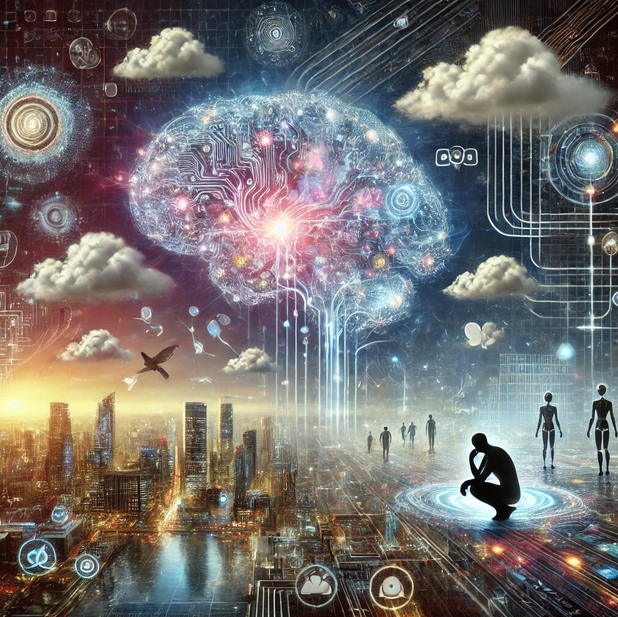THE EXTERNAL BRAIN IN YOUR POCKET
(NFLX), (GOOGL), (AAPL), (MSFT), (TSLA), (AMZN), (PLTR), (LNVGY), (AI), (PATH), (AMD), (INTC), (CRWD), (PANW)
If human consciousness were a Netflix series (NFLX), we've just entered season three with a plot twist that would make Christopher Nolan scratch his head.
Scientists are now telling us we're developing a new way of thinking - not inside our heads, but somewhere in the cloud, probably right next to your backed-up photos on Google Drive (GOOGL).
For years, psychologists have told us we have two thinking systems: the quick, intuitive part of your brain that knows exactly which Thai takeout to order on a Tuesday, and the slower, more analytical part that helps you decide whether to buy or sell Tesla (TSLA).
Now, thanks to AI, we're apparently getting a third system - like adding a very smart, slightly alien roommate to your mental apartment, courtesy of companies like Microsoft (MSFT) and their OpenAI partnership.
They're calling it "System 0," which sounds suspiciously like a startup that would appear on "Shark Tank."
Think of it as having a galactic-sized external hard drive for your brain, powered by the likes of NVIDIA's (NVDA) semiconductors and stored on Amazon's (AMZN) AWS servers.
Just as your iPhone (AAPL) doesn't bother remembering phone numbers anymore because it knows you've got them stored, our brains are entering a fascinating codependency with AI that's less "Ex Machina" and more "When Harry Met Siri."
Needless to say, this relationship is proving particularly lucrative for companies building the infrastructure of our new cognitive ecosystem.
The fascinating twist is that this System 0, unlike your human brain, doesn't actually understand what it's processing. It's like having the world's most efficient personal assistant - think Palantir (PLTR) for your mind - who can organize your entire life but doesn't get why you cry during dog food commercials.
The research, coming from Lenovo (LNVGY) and their Infrastructure Solutions Group, suggests that we've created a mental butler who can handle all the heavy lifting of data processing but still needs us to decide what it all means - sort of like having ChatGPT write your wedding vows but still needing to add the actual emotion yourself.
As for the risks? Well, imagine becoming so dependent on GPS that you forget how to read a map - except now we're talking about potentially forgetting how to think critically or innovate on our own.
It's like intellectual autopilot: convenient until you suddenly need to land the plane yourself.
There's also the small matter of synthetic data potentially warping our grip on reality, which is exactly what we needed in the era of deep fakes and Instagram filters. It's as if reality itself is getting a MetaFaceTune filter, and we're all trying to figure out if our thoughts are actually our thoughts or just really good AI suggestions.
Consequently, this cognitive shift is driving growth in AI safety and ethics platforms, benefiting companies like C3.ai (AI) and UiPath (PATH) that focus on responsible AI deployment.
Actually, the market opportunities could span across sectors, from chip makers like AMD (AMD) and Intel (INTC) to cloud providers like Amazon, Microsoft, and Google.
But what's truly fascinating isn't just the individual players - it's how these companies are weaving together to create something greater than the sum of their parts.
It's like watching the industrial revolution of the mind unfold in real-time, with each company carefully crafting its piece of our new cognitive infrastructure.
Some might find this prospect unsettling - the idea of outsourcing portions of our thinking to machines might send you planning an escape to an off-grid cabin in Montana. But before you panic, there's good news.
This System 0 could be humanity's power-up mushroom, helping us tackle problems that would normally make our brains feel like they're running Windows 95. Whether it's solving climate change or finally figuring out why your printer never works when you really need it, AI could be our cognitive superhero sidekick.
So, what’s the play here? Well, I suggest a balanced approach.
The smart money is spreading bets across established tech giants (let’s say around 40% exposure), semiconductor manufacturers (30%), pure-play AI companies (20%), and cybersecurity firms like CrowdStrike (CRWD) and Palo Alto Networks (PANW) that protect these systems (10%).
Essentially, this strategy is like building a cognitive portfolio that mirrors the very architecture of System 0 itself.
But just as we're carefully structuring our investments, researchers are reminding us to establish some ground rules for this new mental ménage à trois. Think of it as a prenup for our relationship with AI.
We should demand transparency, accountability, and digital literacy, which is a fancy way of saying we should probably know what we're getting into before we outsource our thinking to the cloud.
Like any good relationship, it's all about boundaries. We need to make sure this external brain remains our trusted advisor rather than becoming our thought overlord.
After all, we don't want to end up in a situation where Alexa isn't just choosing our playlist but deciding our life choices.
In the end, it seems the key to navigating this brave new world isn't about fighting the future - it's about making sure we're still the ones writing the script, even if AI is helping us with the spelling.
Now, if you'll excuse me, I need to ask my phone if I should be worried about any of this.



